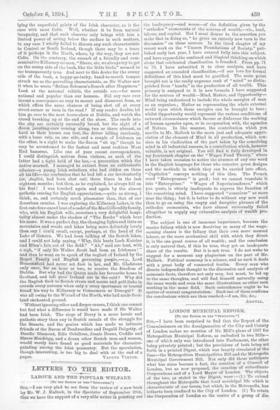LETTERS TO THE EDITOR.
LABOUR AND THE POPULAR WELFARE. [To THE EDITOR OF THE " SPECTATOR."] SIR,—I am very glad to see from the review of a new book by Mr. W. J. Mallock, in the Spectator of September 29th, that we have the support of a very able writer in pointing out the inadequacy—and worse—of the definition given by the " orthodox " economists of the sources of wealth,—viz., land, labour, and capital. But I must demur to the assertion you make that in doing so, " he gives an entirely new turn to the discussion" on those sources. In the third chapter of my recent work on the " Unseen Foundations of Society," pub- lished early last year, I have entered fully into this subject, and have exposed.the confused and illogical thinking on which alone that celebrated classification is founded. From pp. 71 to 79, I have submitted it to close analysis, and have suggested an amended classification,—if our love for formal definitions of this kind must be gratified. The main point brought out is the really supreme rank of "mind" as distin- guished from "hands," in the production of all wealth. This primacy is assigned to it in new formula I have suggested for the sources of wealth—Mind, Matter, and Opportunity— Mind being understood to include the whole energies of man as an organism ; Matter as representing the whole external world upon which these energies can be brought to bear ; whilst Opportunity would represent the various conditions of outward circumstance which favour or disfavour the working of human agencies upon, or in co-operation with, the agencies of Nature. In like manner, the contribution which you ascribe to Mr. Mallock to the more just and adequate appre- ciation of the element of Mind in all production, which con- sists in his vindication of the part taken by the conceiving mind in all industrial success, is a contribution which, however valuable, is not original. You will find it fully developed in my fourteenth chapter on the "Wages Fund Theory," where I have taken occasion to notice the absence of any one word in the English language for those who conceive great designs and the methods in which they can be carried into effect. " Capitalist " conveys nothing of this idea. The French word "Entrepreneur " is good ; but we cannot translate it into "Enterpriser." "Wages of Superintendence," which you quote, is utterly inadequate to express the function of the conceiving mind. I have suggested "conceiver" as more near the thing; but it is better to do without any new word than to go on using the empty and deceptive phrases of the orthodox economists, who have almost universally failed altogether to supply any exhaustive analysis of wealth pro- duction.
The subject is one of immense importance, because the master fallacy which is now deceiving so many of the wage- earning classes is the fallacy that their own mere manual labour, or the mere mechanical skill with which they direct it, is the one great source of all wealth ; and the conclusion is only natural that, if this be true, they get an inadequate share of the results. But it is not true. I do not write to suggest for a moment any plagiarism on the part of Mr. Mallock. Political economy is a science, and as such it deals with a great body of connected truths. Every man who directs independent thought to the discussion and analysis of economic facts, therefore not only may, but must, be led up to the same thoughts, and will find himself naturally using the same words and even the same illustrations as other men
working in the same field. Such coincidences ought to be matter of mutual congratulation. Each one of them confirms the conclusions which are thus reached.—I am, Sir, &e.,
ARGYLL.






































 Previous page
Previous page